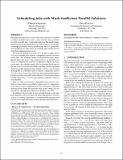Scheduling Jobs with Work-Inefficient Parallel Solutions
Author(s)
Kuszmaul, William; Westover, Alek
Download3626183.3659960.pdf (1.160Mb)
Publisher Policy
Publisher Policy
Article is made available in accordance with the publisher's policy and may be subject to US copyright law. Please refer to the publisher's site for terms of use.
Terms of use
Metadata
Show full item recordAbstract
This paper introduces the serial-parallel decision problem. Consider an online scheduler that receives a series of tasks, where each task has both a parallel and a serial implementation. The parallel implementation has the advantage that it can make progress concurrently on multiple processors, but the disadvantage that it is (potentially) work-inefficient. As tasks arrive, the scheduler must decide for each task which implementation to use.
We begin by studying total awake time. We give a simple decide-on-arrival scheduler that achieves a competitive ratio of 3 for total awake time---this scheduler makes serial/parallel decisions immediately when jobs arrive. Our second result is an parallel-work-oblivious scheduler that achieves a competitive ratio of 6 for total awake time---this scheduler makes all of its decisions based only on the size of each serial job and without needing to know anything about the parallel implementations. Finally, we prove a lower bound showing that, if a scheduler wishes to achieve a competitive ratio of O(1), it can have at most one of the two aforementioned properties (decide-on-arrival or parallel-work-oblivious). We also prove lower bounds of the form 1 + Ømega(1) on the optimal competitive ratio for any scheduler.
Next, we turn our attention to optimizing mean response time. Here, we show that it is possible to achieve an O(1) competitive ratio with O(1) speed augmentation. This is the most technically involved of our results. We also prove that, in this setting, it is not possible for a parallel-work-oblivious scheduler to do well.
In addition to these results, we present tight bounds on the optimal competitive ratio if we allow for arrival dependencies between tasks (e.g., tasks are components of a single parallel program), and we give an in-depth discussion of the remaining open questions.
Description
SPAA ’24, June 17–21, 2024, Nantes, France
Date issued
2024-06-17Publisher
ACM|SPAA '24: Proceedings of the 36th ACM Symposium on Parallelism in Algorithms and Architectures
Citation
Kuszmaul, William and Westover, Alek. 2024. "Scheduling Jobs with Work-Inefficient Parallel Solutions."
Version: Final published version
ISBN
979-8-4007-0416-1
Collections
The following license files are associated with this item: